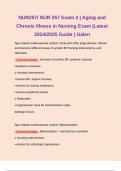Exam (elaborations)
NUR257/ NUR 257 Exam 3 | Aging and Chronic Illness in Nursing Exam |Latest 2024/2025 Guide | Galen
- Course
- Institution
NUR257/ NUR 257 Exam 3 | Aging and Chronic Illness in Nursing Exam |Latest 2024/2025 Guide | Galen NUR257/ NUR 257 Exam 3 | Aging and Chronic Illness in Nursing Exam |Latest 2024/2025 Guide | Galen NUR257/ NUR 257 Exam 3 | Aging and Chronic Illness in Nursing Exam |Latest 2024/2025 Guide | Ga...
[Show more]



